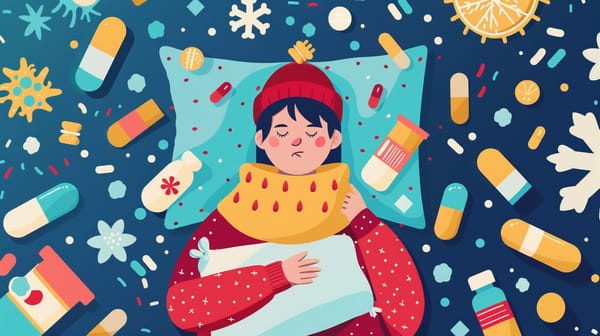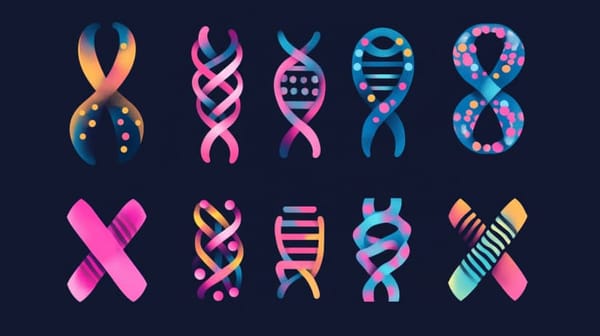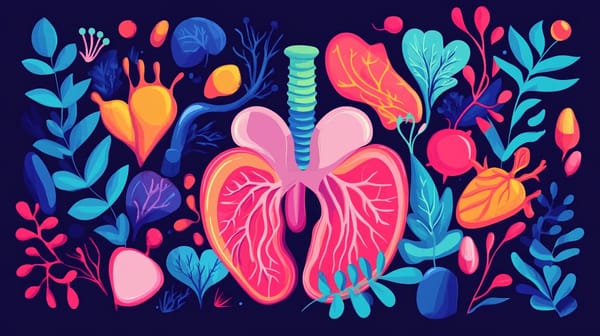This information is strictly speculative and based on my own experiences. This does not mean that it will be the same for you. Treat this information as strictly educational and not an endorsement for dry fasting when sick.
A lot of people who witness the miraculous benefits of fasting, naturally assume that there may be a chance to harness its power to stop sicknesses. While there may be a lot of truth to this, this may boil down to timing and be very situational. I know you want a clear-cut answer, but unfortunately I don’t have one. What I can provide is a few theories based on my experiences and the mixing of scientific reasoning. If you are worried and unsure, don't do it. Once you gain more experience with dry fasting, this decision will become much easier.
Xenophagy
Dry fasting upregulates autophagy, and with it, xenophagy. Xenophagy is the process by which a cell directs autophagy against pathogens, as reflected in the study of antiviral defenses. Xenophagy gets stronger the longer your dry fast, however, you have to take into consideration timing and viral load. My speculation is that xenophagy only truly comes into high power around the 72 hour mark. If you catch the sickness early, you can make it on time to activate the deeper autophagy and xenophagy, but if you start fasting when near the peak of the disease, you may put yourself in a worse position. You will feel terrible and probably break the fast.
Immune Suppression
If already deep into the illness (near peak), it would make sense to take the necessary vitamins and medication while going light on the carbohydrates, which means no fasting. It can get very uncomfortable if you’re already suffering peak symptoms, and it doesn’t make sense to add a 72-hour transition period. If you stop too early after starting without healing the illness, you can potentially be worse off as the immune system suppression effect compounds and causes worsening of symptoms. In cases where you won’t go all the way with the healing, it would have been better to do simple calorie and carb restriction diets which won’t impact the immune cells much and won’t cause insulin and blood glucose to skyrocket. If you are able to maintain the dry fast (assuming your condition allows for no water or food) the resulting autophagy and xenophagy should do the job.
Similarly, Jordan et al. found that a 48-hour water-only fast reduced monocyte mobilization after Listeria infection or wound healing (Jordan et al., 2019). By contrast, Collins et al. showed enhanced protection against infections and tumors when only a 50% calorie restriction was applied instead of water-only fasting (Collins et al., 2019). These studies raise the possibility that a complete lack of nutrients, but not the partial fasting conditions, may result in some immune impairments. https://www.ncbi.nlm.nih.gov/pmc/articles/PMC7474734/
Contraindications
If your illness is causing vomiting or diarrhea you should consider water fasting instead of dry fasting. Obviously. The same goes for many other relevant scenarios.
You need to be aware of your pre-existing conditions and how they will be impacted by a dry fast and sickness combined. Most illnesses cause the body to dump sugar into the bloodstream, while the stress of the infection also causes insulin resistance. This can lead to a lot of damage and complications especially if you're already pre-diabetic or suspect insulin resistance. If I were insulin resistant (as I have been in the past and accentuated after long covid) then catching an illness early and going on a dry fast makes a lot of sense to me.
Bed rest
Resting is crucial when you’re sick, but we also know that inactivity, even if short-term, is linked to insulin resistance. Bed rest — during which your muscles use less glucose, even when you are not sick — also contributes to blood glucose elevation. A study found that 6 days of strict bed rest in healthy volunteers caused their blood glucose to rise.
When you add bed rest on top of your body’s normal stress responses during sickness, it makes sense why your your blood glucose levels are higher than usual. This also creates a perfect environment to consider fasting. It’s no wonder that really sick animals dry fast instinctually. If you’re going to be lying around with insulin resistance, you should try to lower the amount of insulin being produced by minimizing blood sugar as best as possible. Bed-rest-induced insulin resistance occurs primarily in muscle - ScienceDirect




